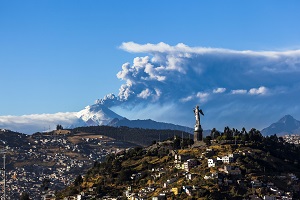
Today 54 per cent of the world’s population lives in urban areas. By 2050, almost three quarters of the world’s population will live in urban areas – this will be the Century of the City. The New Urban Agenda to be adopted by Habitat III, the United Nations Conference on Housing and Sustainable Urban Development (Quito, 17-20 October 2016), will pave the way for how our cities, towns and villages will be planned and managed, in order to fulfill their role as drivers of sustainable development.
The New Urban Agenda specifically highlights the important role of regional organizations in its implementation. According to the Habitat III Regional Reports on Housing and Urban Development, the regional level provides a vital bridge between global frameworks and national and local development agendas. Addressing multiple urban development challenges identified by the Regional Reports, including the growing social and spatial inequalities within and among cities; lack of capacity of local authorities to urban management, especially in developing countries and countries with transition economies; and lack of institutionalized cooperation between different levels of governments and sectors; will require regional coordination.
The importance of the regional organisations and specifically of UN Regional Commissions for the New Urban Agenda implementation was re-iterated by mayors of major global cities, including Mayor of Mexico City Mr. Miguel Angel Mancera and Mayor of Surabaya Ms. Tri Rismaharini who attended the Habitat III high-level Side Event organized by the five Un Regional Commissions in Quito, Ecuador. The speakers stressed that coordination of the implementation of the New Urban Agenda at regional level is critical for the implementation and that UN Regional Commissions are uniquely positioned to facilitate regional commitments from member States and local governments towards the implementation of the New Urban Agenda at global level; cities are committed to working together on the regional implementation.
Executive Secretaries and high-level representatives of UN Regional Commissions confirmed the Commissions will continue working to strengthen the cooperation with cities and their networks and will further support the institutionalization of the cooperation between global, regional, national and local levels to implement the New Urban Agenda. They highlighted the importance of the integrated approach of the New Urban Agenda, which promotes close links in the implementation with the 2030 Agenda for Sustainable Development, the Paris Agreement and other important global political frameworks. In order to achieve impact, it is vital for the New Urban Agenda to build upon and reinforce the SDGs and to facilitate the localization and operationalization of the 2030 Agenda for Sustainable Development. It will be important to leverage and make full use of regional platforms and mechanisms, including the Regional Forums on Sustainable Development, stressed the high level representatives of the Regional Commissions.
In his concluding remarks, Mr. Joan Clos, Executive Director of the United Nations Human Settlements Programme - UN-Habitat praised the Regional Reports for Housing and Sustainable Urban Development prepared for the Conference jointly by the Habitat III Secretariat, UN Regional Commissions and UN-Habitat and invited the Regional Commissions to continue the cooperation. As a next step, he called for the organization of a joint conference of UN Regional Commissions, UN-Habitat and cities to address the municipal finance issues.